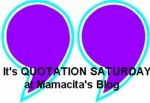 Mamacita says: Some people don’t like quotations. “They’re not original!” or some such, blahblahblah. I like a good quotation. They make me more original. A good quotation is a thought made sharable.
Mamacita says: Some people don’t like quotations. “They’re not original!” or some such, blahblahblah. I like a good quotation. They make me more original. A good quotation is a thought made sharable.
I’ve been collecting quotations since I was in my teens; that’s as much as ten years. (coughcough) When we moved, I thought I’d lost my original classy file system which consisted of a paper ream box lid and ten thousand little lined file cards. Last week, finally boxing up some random things in my former laundry room, I found the lid.
“I finally found the lid!” Go nuts, Google.
Usually I try to have a theme, but not this time. I’m just going to go in order, “order” in this case being somewhat amusing to consider in and of itself. We’ll call it “A.” Letter “A.”
1. Where tillage begins, other arts follow. The farmers, therefore, are the founders of human civilization. — Daniel Webster
2. There are some people whose idea of adventure is to sit home like great puddings with the sauce of television pouring over them. — Gene Rheaume
3. To obtain maximum attention, it’s hard to beat a good, big, mistake. — Anon.
4. Don’t be content with being average. Average is as close to the bottom as it is to the top. — Anon. (This has been my motto for many years!)
5. Wisdom doesn’t necessarily come with age. Sometimes age just shows up all by itself. — Tom Wilson
6. Most people are willing to pay more to be amused than to be educated. — Robert Savage
7. Be ashamed to die until you have achieved some victory for humanity. — Horace Mann
8. We need programs that will teach athletes how to SPELL “Jump shot” rather than how to shoot it. — Larry Hawkins
9. An ass is but an ass, though laden with gold. — Thomas Fuller
10. Art is the signature of civilization. — Beverly Sills
11. Compared with what we ought to be, we are only half awake. The human individual lives usually far within his limits; he possesses powers of various sorts which he habitually fails to use. — William James
12. Be wary of the man who urges an action in which he himself incurs no risk. — Joaquin Setanti
13. Ancestry is most important to those who have done nothing themselves. — Louis L’Amour
14. I love good creditable acquaintance; I love to be the worst of the company. — Jonathan Swift
15. Action is eloquence, and the eyes of the ignorant are more learned than the ears. — Shakespeare
16. A work of art is a corner of creation seen through a temperament. — Emile Zola
17. You don’t need to take a person’s advice to make him feel good – just ask for it. — Laurence J. Peter
18. An appeaser is one who feeds a crocodile – hoping it will eat him last. — Winston Churchill
19. Activity is the politician’s substitute for achievement. — Anon
20. What art offers is space – a certain breathing room for the spirit. — John Updike
21. The great artists of the world are never Puritans, and seldom even ordinarily respectable. — H. L. Hencken
22. I am bound to furnish my antagonists with arguments, but not with comprehension. — Disraeli
23. Who serves his country well has no need of ancestors. — Voltaire
24. Art is not a thing; it is a way. — Elbert Hubbard
25. He is a man of splendid abilities, but utterly corrupt. He shines and stinks like rotten mackerel by moonlight. — John Randolph
26. Art is our chief means of breaking bread with the dead. — W.H. Auden
27. The same wind snuffs candles yet kindles fires; so, where absence kills a little love, it fans a great one. — La Rochefoucauld
28. He had the general look of an elderly fallen angel traveling incognito. — Peter Quennell
29. If you can tell the difference between good advice and bad advice, you don’t need advice. — the OK Rotary Club Bulletin
30. Admiration is our polite recognition of another man’s resemblance to ourselves. — Ambrose Bierce
31. There are those, I know, who will say that the liberation of humanity, the freedom of man and mind, is nothing but a dream. They are right. It is. It is the American Dream. — Archibald MacLeish
32. Scratch an artist, and you surprise a child. — James Huneker
33. The most original modern authors are not so because they advance what is new, but simply because they know how to put what they have to say as if it had never been said before. — Goethe
34. An actor is a sculptor who carves in snow. — Laurence Barrett
35. I have one rule: attention. They give me theirs and I give them mine. — Sister Evangelist RSM ( My only rule for years!)
36. Being about to pitch his camp in a likely place, and hearing there was no hay to be had for the cattle, “What a life,” said he,”is ours, since we must live according to the convenience of asses!” — Plutarch
37. I think it’s interesting how much we can accomplish before we find out we can’t do something. — General Leslie Groves
38. Authority does not make you a leader. It gives you the opportunity to be one. — Unknown
39. There is a natural aristocracy among men. The grounds of this are virtue and talent. — Jefferson
40. Adventures are an indication of inefficiency. Good explorers don’t have them. — Herbert Spencer Dickey
41. Advice: the suggestions you give someone else which you believe will work to your benefit. — Anon.
42. Each snowflake in an avalanche pleads not guilty. — Stanislaus J. Lee
43. Amnesty: the state’s magnanimity to those offenders whom it would be too expensive to punish. — Ambrose Bierce
44. Every genuine work of art has as much reason for being as the earth and the sun. — Emerson
45. Amusement is the happiness of those who cannot think. — Alexander Pope
46. Acting without thinking is like shooting without aiming. — B.C. Forbes
47. Become so wrapped up in something that you forget to be afraid. — Lady Bird Johnson
48. I have long been disposed to judge men by their average. If it is reasonably high, I am charitable with faults that look pretty black. — Ed Howe
49. When two men in a business always agree, one of them is unnecessary. — William Wrigley, Jr.
50. No matter what accomplishments you achieve, somebody helps you. — Althea Gibson
51. It is easy to sit up and take notice. What is difficult is getting up and taking action. — Al Batt
52. By appreciation we make excellence in others our own property. — Voltaire
53. Most of us ask for advice when we know the answer but want a different one. — Ivern Ball
54. “Automatic” simply means that you cannot repair it yourself. — Anon.
55. He that makes himself an ass, must not take it ill if men ride him. — Thomas Fuller
56. Old age is the most unexpected of all things that happen to a man. — Leon Trotsky
57. Advice is offensive because it shows us that we are known to others, as well as to ourselves. — Samuel Johnson
58. Art comes to you proposing frankly to give nothing but the highest quality to your moments as they pass. — Walter Pater
59. The axis of the earth sticks out visibly through the centre of each and every town or city. — Oliver Wendell Holmes
60. There is no absurdity so palpable but that it may be firmly planted in the human head if you only begin to inculcate it before the age of five, by constantly repeating it with an air of great solemnity. — Shopenhauer
61. It’s not how old you are, but how you are old. — Marie Dressler
62. Age does not protect you from love. But love, to some extent, protects you from age. — Anais Nin
63. Old people like to give good advice, as solace for no longer being able to provide bad examples. — La Rochefoucauld
64. What wrestles with us strengthens our nerves and sharpens our skill. Our antagonist is our helper. — Edmund Burke
65. Almost all absurdity of conduct arises from the imitation of those whom we can not resemble. — Samuel Johnson
66. There is something that is much more scarce, something rarer than ability. It is the ability to recognize ability. — Robert Half
67. Anyone who says you can’t see a thought simply doesn’t know art. — Wynetka Ann Reynolds
68. Knowing you’ll have something good to read before bed is among the most pleasurable of sensations. — Vladimir Nabokov
69. Action without study is fatal. Study without action is futile. — Mary Beard
70. One good thing about becoming ninety years old is that you’re not subject to much peer pressure. — Anon.
71. What I like in a good author is not what he says, but what he whispers. — Logan Pearsall Smith
72. The trouble with good advice is that it usually interferes with our plans. — E.W. Howe
73. Anyone who conducts an argument by appealing to authority is not using his intelligence; he is just using his memory. — Leonardo Da Vinci
74. True affluence is not needing anything. — Gary Snyder
75. One thing most alumni won’t stand for is a college football team that plays like a bunch of amateurs. — G. Norman Collie
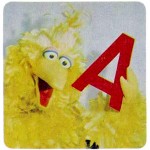 You might have noticed that all of these quotations have something to do with the letter “A.” I’d insert a Sesame Street remark here, but I don’t want to get political.
You might have noticed that all of these quotations have something to do with the letter “A.” I’d insert a Sesame Street remark here, but I don’t want to get political.
76. Never refer to me as an item. I’m a bird. — Big Bird
My bad.



 Mamacita says: Some people don’t like quotations. “They’re not original!” or some such, blahblahblah. I like a good quotation. They make me more original. A good quotation is a thought made sharable.
Mamacita says: Some people don’t like quotations. “They’re not original!” or some such, blahblahblah. I like a good quotation. They make me more original. A good quotation is a thought made sharable. You might have noticed that all of these quotations have something to do with the letter “A.” I’d insert a Sesame Street remark here, but I don’t want to get political.
You might have noticed that all of these quotations have something to do with the letter “A.” I’d insert a Sesame Street remark here, but I don’t want to get political. Mamacita says: Remember that anecdote about the young bride whose husband asked her why she cut the beef roast in half before she put it in the pan?
Mamacita says: Remember that anecdote about the young bride whose husband asked her why she cut the beef roast in half before she put it in the pan? unless it was made with Velveeta.
unless it was made with Velveeta.
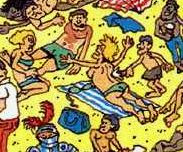
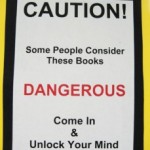 excellent, although it didn’t sit well with administration. She spoke about high school ‘graduates’ for whom a diploma was nothing but a piece of paper that connoted untruths. She spoke about how an employer should have the right to assume that a diploma pretty much guaranteed literacy and general competence. She spoke about all the money big corporations were having to shell into remedial programs for employees who had diplomas, pieces of paper that represented four years of showing up and not much else. She spoke about how businesses would really appreciate a diploma that told the truth: that if a student had been graduated out of respect for really trying, the diploma should say so, discretely of course, but in terms that the business world would be able to interpret. If the student was just going through the motions of graduation for self-esteem’s sake, the diploma should say so. And if the diploma was rightfully earned because the student had become fully literate and generally competent and had genuinely and individually and truthfully learned how to care for himself/herself in the world in general, the business world should be able to see that kind of diploma and interpret it for what it was: a real diploma.
excellent, although it didn’t sit well with administration. She spoke about high school ‘graduates’ for whom a diploma was nothing but a piece of paper that connoted untruths. She spoke about how an employer should have the right to assume that a diploma pretty much guaranteed literacy and general competence. She spoke about all the money big corporations were having to shell into remedial programs for employees who had diplomas, pieces of paper that represented four years of showing up and not much else. She spoke about how businesses would really appreciate a diploma that told the truth: that if a student had been graduated out of respect for really trying, the diploma should say so, discretely of course, but in terms that the business world would be able to interpret. If the student was just going through the motions of graduation for self-esteem’s sake, the diploma should say so. And if the diploma was rightfully earned because the student had become fully literate and generally competent and had genuinely and individually and truthfully learned how to care for himself/herself in the world in general, the business world should be able to see that kind of diploma and interpret it for what it was: a real diploma.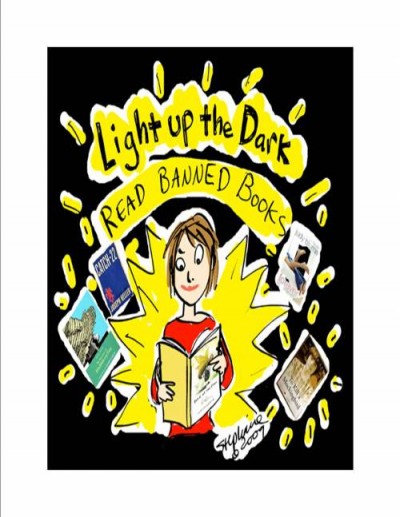 My friends are mostly lawyers, musicians, writers, speakers, businesspeople, and other educators. Before the edict went out, I often had one of them come to my classroom and talk about what they did all day, and then the students would ask questions. Silly me, I really thought it was helpful.
My friends are mostly lawyers, musicians, writers, speakers, businesspeople, and other educators. Before the edict went out, I often had one of them come to my classroom and talk about what they did all day, and then the students would ask questions. Silly me, I really thought it was helpful.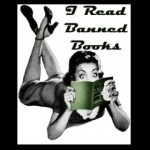 Apparently, it was unfair to other students if one group got to have a speaker and others didn’t. I suggested that other teachers could just as easily invite a speaker into their classroom, too, but nobody else cared to go to the trouble, so I couldn’t, either.
Apparently, it was unfair to other students if one group got to have a speaker and others didn’t. I suggested that other teachers could just as easily invite a speaker into their classroom, too, but nobody else cared to go to the trouble, so I couldn’t, either. from an ant colony.
from an ant colony. Mamacita says: There will always be students who have no idea of their standing in a class; honestly, when a student says to me, “How am I doing in this class? What’s my average?” I want to scream. Even if he is computer-illiterate (and if so, he won’t make it at the college level, sowwy) all he has to do is check his folder. All graded work is supposed to be kept in there, and if he’s that anxious to know his standing, he can add up his scores and average them on paper. Sheesh. Of course, if there are no graded papers in his/her folder, I’m going to guess that he/she isn’t doing all that well. In my class, you have to show up and do the work and TURN IT IN if you want to pass. I’m unreasonable like that.
Mamacita says: There will always be students who have no idea of their standing in a class; honestly, when a student says to me, “How am I doing in this class? What’s my average?” I want to scream. Even if he is computer-illiterate (and if so, he won’t make it at the college level, sowwy) all he has to do is check his folder. All graded work is supposed to be kept in there, and if he’s that anxious to know his standing, he can add up his scores and average them on paper. Sheesh. Of course, if there are no graded papers in his/her folder, I’m going to guess that he/she isn’t doing all that well. In my class, you have to show up and do the work and TURN IT IN if you want to pass. I’m unreasonable like that.
